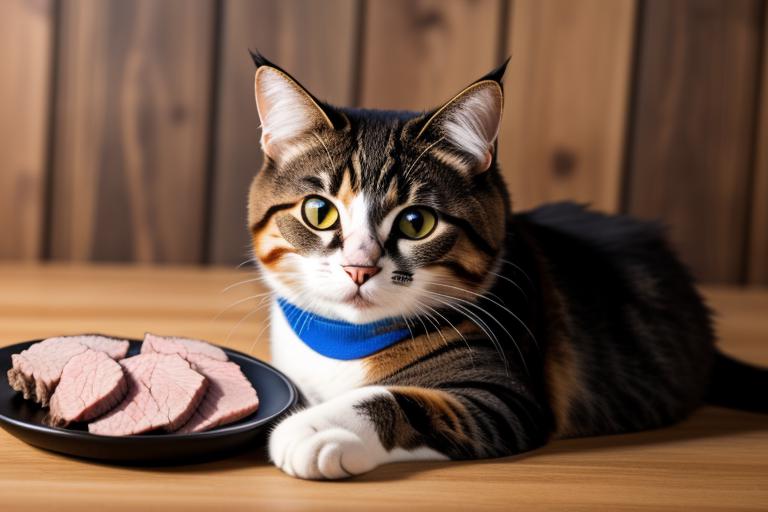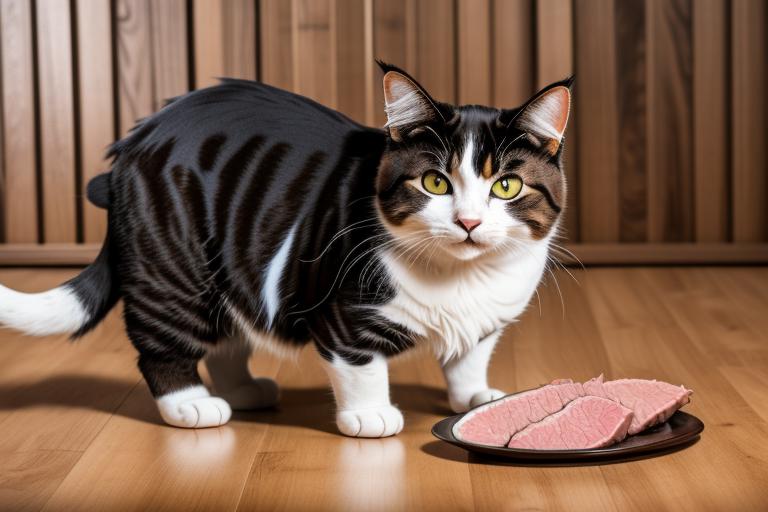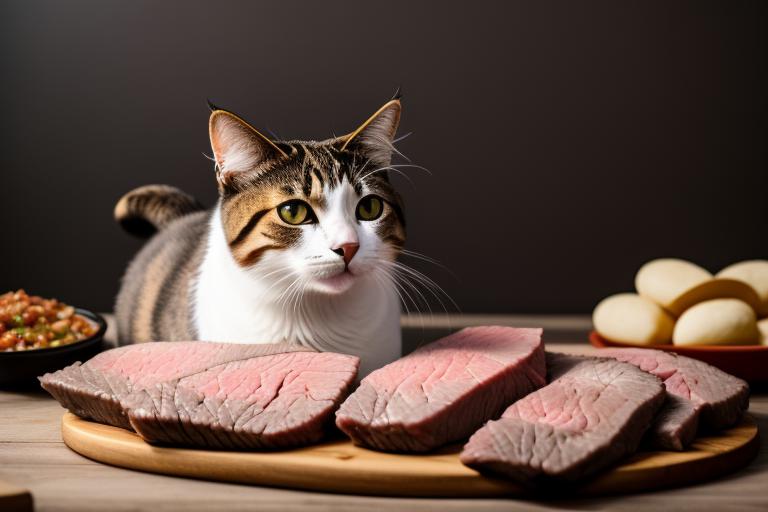Have you ever wondered if cats can eat beef? It’s a common question among cat owners, and the answer is not as straightforward as you might think.
While cats are obligate carnivores and require a diet rich in animal protein, not all types of meat are created equal when it comes to feline nutrition.
In this discussion, we will explore the nutritional value of beef for cats, the potential benefits and risks associated with its consumption, and how to introduce it safely into your cat’s diet.
So, let’s find out if beef is a suitable option for your feline friend’s meals.
The Nutritional Value of Beef for Cats

Beef is a highly nutritious protein source for cats, providing essential amino acids and supporting their overall health. Cats are obligate carnivores, which means that they require a diet that consists primarily of meat. Beef is an excellent choice for meeting their dietary needs, as it’s packed with essential nutrients.
One of the key benefits of beef is its high protein content. Protein is essential for cats as it helps to build and repair tissues, supports a healthy immune system, and aids in proper growth and development.
Beef also contains important vitamins and minerals, such as vitamin B12, iron, and zinc, which are crucial for maintaining optimal health. Additionally, beef is a rich source of taurine, an amino acid that’s essential for cats. Taurine plays a vital role in maintaining healthy heart function, vision, and reproductive health.
It’s important to note that while beef is a nutritious protein source for cats, it should be fed in moderation and cooked thoroughly to eliminate any potential bacteria or parasites that could be harmful to your feline friend.
Protein Requirements for Feline Health
To ensure optimal feline health, it’s important to understand their protein requirements. Protein is an essential nutrient that plays a crucial role in various bodily functions for cats. As obligate carnivores, cats have a higher dietary protein requirement than many other animals. Protein is necessary for the growth, repair, and maintenance of tissues, as well as the production of hormones, enzymes, and antibodies. It also provides energy and helps regulate metabolism.
Cats require specific amino acids, such as taurine and arginine, which are found in animal-based proteins. These amino acids are vital for their overall health, and a deficiency can lead to serious health issues. It’s crucial to provide cats with high-quality protein sources, such as meat, poultry, and fish, to meet their nutritional needs. Additionally, the protein content in their diet should be balanced with other essential nutrients.
Consult with a veterinarian to determine the appropriate protein intake for your cat based on their age, weight, and overall health. By meeting their protein requirements, you can help support your feline companion’s overall health and well-being.
Potential Health Benefits of Feeding Cats Beef

Now let’s talk about the potential health benefits of feeding your cat beef.
Beef isn’t only rich in essential nutrients, but it also provides important amino acids that cats need for their overall well-being.
Additionally, the digestibility of beef can help support healthy digestion in your feline friend.
Nutritional Value of Beef
Feeding your cat beef can provide them with essential nutrients and potential health benefits. Beef is a rich source of protein, which is crucial for your cat’s overall health and wellbeing. Protein helps support muscle development, repair tissue, and strengthen the immune system.
Additionally, beef contains important vitamins and minerals such as vitamin B12, iron, and zinc. Vitamin B12 is essential for healthy brain function and the production of red blood cells. Iron helps transport oxygen throughout the body, while zinc supports a healthy immune system.
Including beef in your cat’s diet can also provide them with essential amino acids, which are necessary for various bodily functions. However, it’s important to ensure that the beef is cooked thoroughly and free from any seasonings or additives that may be harmful to your cat.
Digestive Benefits of Beef
Including beef in your cat’s diet can contribute to digestive health and offer potential benefits for their overall well-being. Here are some digestive benefits of feeding cats beef:
- Improved digestion: Beef contains high-quality protein that’s easily digestible, promoting a healthy digestive system in cats.
- Increased nutrient absorption: The amino acids found in beef help cats absorb essential nutrients more efficiently, supporting their overall health.
- Reduced risk of digestive issues: The natural enzymes present in beef aid in breaking down food, reducing the likelihood of digestive problems such as bloating or constipation.
- Enhanced gut health: Beef contains beneficial bacteria that can support a healthy balance of gut flora in cats, promoting optimal digestion and nutrient absorption.
Considerations for Introducing Beef to Your Cat’s Diet
Have you considered the potential benefits and risks of introducing beef into your cat’s diet?
While beef can be a nutritious addition to your cat’s meals, there are a few important considerations to keep in mind.
First and foremost, it’s essential to ensure that the beef you offer your cat is cooked thoroughly. Raw or undercooked beef can contain harmful bacteria such as Salmonella or E. coli, which can lead to gastrointestinal issues or even food poisoning. So, always cook the beef until it’s well-done to eliminate any potential risks.
Another consideration is the quality of the beef. Opt for lean cuts of beef that are free from any seasoning or marinades. Avoid using processed meats, as they often contain additives and preservatives that may not be suitable for your cat’s digestive system. Additionally, be cautious about using beef as the sole source of protein for your cat’s diet. Cats require a balanced diet that includes a variety of proteins, so make sure to incorporate other sources such as chicken or fish.
Lastly, it’s crucial to monitor your cat’s response to beef. Some cats may have allergies or sensitivities to beef, which can manifest as skin irritations or digestive upset. If you notice any adverse reactions, it’s best to consult with your veterinarian and discontinue feeding beef to your cat.
Risks and Allergies Associated With Beef Consumption in Cats
While considering the introduction of beef to your cat’s diet, it’s important to be aware of the potential risks and allergies associated with its consumption. Although beef is generally safe for cats to eat, there are a few things to keep in mind.
- Allergies: Just like humans, cats can develop allergies to certain foods, including beef. Allergic reactions may include itching, skin rashes, vomiting, or diarrhea. If you notice any of these symptoms after feeding your cat beef, it’s best to consult with a veterinarian.
- Digestive issues: Some cats may have sensitive stomachs and may experience digestive issues after consuming beef. These issues can range from mild discomfort to more serious conditions like pancreatitis. If your cat has a history of digestive problems, it’s advisable to introduce beef gradually and monitor their reaction closely.
- Bacterial contamination: Raw or undercooked beef can contain harmful bacteria such as Salmonella or E. coli, which can cause food poisoning in cats. It’s crucial to ensure that any beef you feed your cat is properly cooked to eliminate the risk of bacterial contamination.
- High fat content: Beef can be high in fat, which can lead to weight gain and other health problems in cats. If you decide to incorporate beef into your cat’s diet, it’s important to choose lean cuts and serve them in moderation.
How to Safely Prepare and Serve Beef for Cats
To safely prepare and serve beef for your cat, follow these guidelines.
First, make sure to choose lean cuts of beef, such as sirloin or tenderloin, and remove any excess fat or skin. Fat can be difficult for cats to digest and may lead to gastrointestinal issues.
Next, cook the beef thoroughly to kill any potential bacteria or parasites. It’s recommended to cook the beef until it reaches an internal temperature of 145°F (63°C).
Avoid using seasonings or additives, as some spices and ingredients can be toxic to cats.
Serve the beef in small, bite-sized pieces to prevent choking hazards.
Additionally, always let the beef cool down before offering it to your cat to avoid any burns or discomfort.
Remember to monitor your cat while they eat to ensure they’re chewing and swallowing properly.
If you notice any signs of digestive upset or allergic reactions, such as vomiting or diarrhea, discontinue feeding beef and consult your veterinarian.
Alternatives to Beef for Feline Nutrition
If you’re looking for alternatives to beef for your cat’s nutrition, there are several options to consider. While beef can be a great source of protein for your feline friend, it’s always good to offer some variety in their diet. Here are a few alternatives that you can try:
- Chicken: A lean meat that’s high in protein, chicken can be a delicious option for your cat. Make sure to remove the skin and bones before serving it to them.
- Turkey: Another lean meat, turkey is a good choice for cats who may have sensitivities to beef. Just like with chicken, remove the skin and bones before feeding it to your furry friend.
- Fish: Fish is a great source of omega-3 fatty acids, which are beneficial for your cat’s skin and coat health. Opt for low-mercury fish like salmon or trout, and make sure it’s cooked thoroughly to avoid any potential parasites.
- Lamb: If your cat isn’t allergic to lamb, it can be a tasty and nutritious alternative to beef. Lamb is a good source of essential amino acids and can provide your cat with the protein they need.
Frequently Asked Questions
Yes, cats can eat raw beef. However, it is important to ensure that the beef is fresh and of high quality to avoid any potential health risks.
Feeding your cat ground beef can be safe as long as it is cooked thoroughly and doesn’t contain any seasonings or additives that could be harmful to them.
Cooked beef bones can be dangerous for cats. They can splinter and cause choking or damage to the digestive system. It’s best to avoid feeding your cat cooked beef bones and opt for safer alternatives.
Feeding cats raw beef may pose health risks. Raw meat can contain harmful bacteria and parasites that can cause illness. It’s best to consult with a veterinarian before introducing raw food to your cat’s diet.
Yes, cats can be allergic to beef. It’s important to watch for symptoms like vomiting, diarrhea, or skin irritations. If you suspect an allergy, consult your vet for guidance on the best diet for your cat.
Conclusion
In conclusion, cats can safely eat beef as part of their diet, as long as it’s prepared and served properly. Beef provides essential nutrients and protein that are important for feline health.
However, it’s important to introduce beef slowly and monitor for any potential allergies or risks. If your cat has any allergies or sensitivities to beef, there are alternative options available to ensure their nutritional needs are met.

